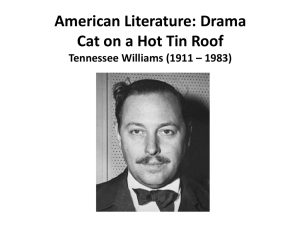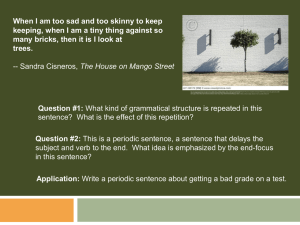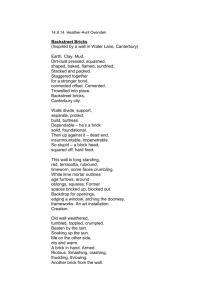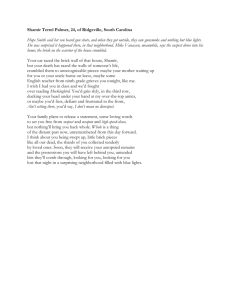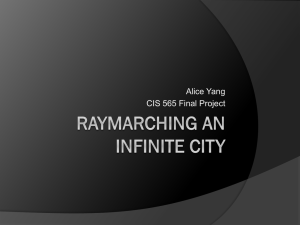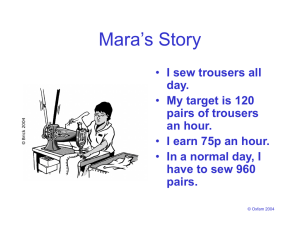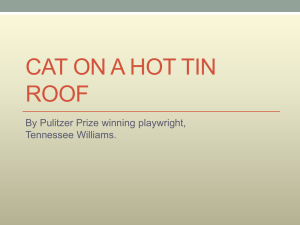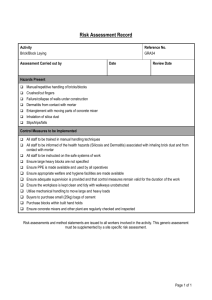Cat on a Hot Tin Roof is a play by Tennessee Williams
advertisement
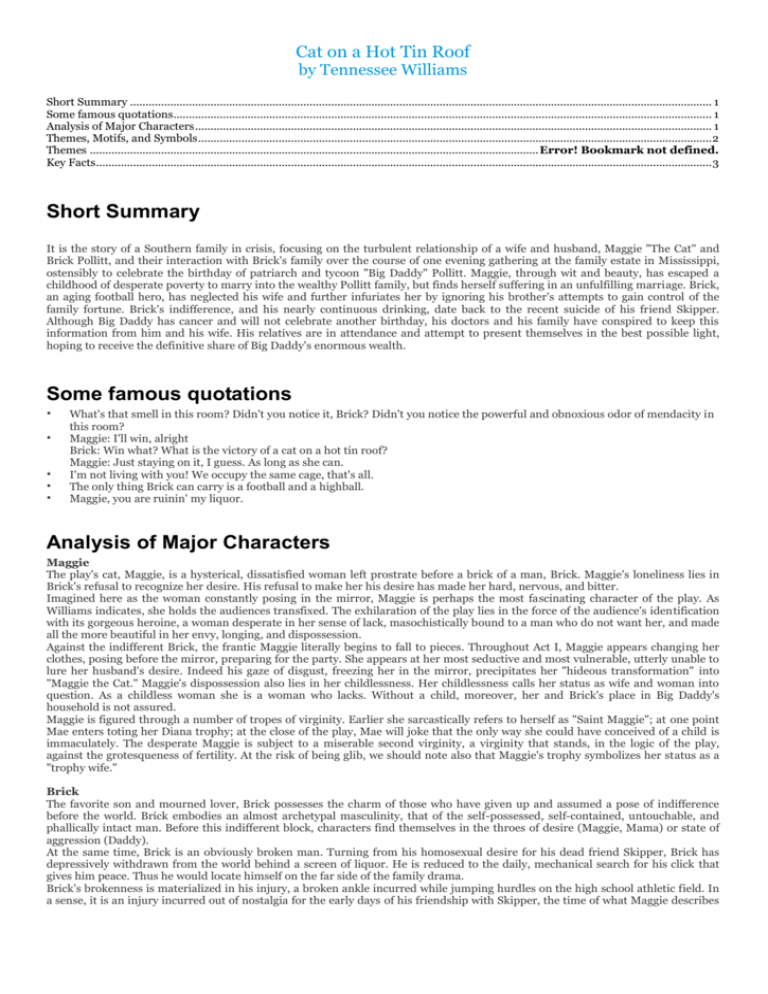
Cat on a Hot Tin Roof by Tennessee Williams Short Summary ............................................................................................................................................................................................ 1 Some famous quotations.............................................................................................................................................................................. 1 Analysis of Major Characters ....................................................................................................................................................................... 1 Themes, Motifs, and Symbols ...................................................................................................................................................................... 2 Themes ................................................................................................................................................. Error! Bookmark not defined. Key Facts....................................................................................................................................................................................................... 3 Short Summary It is the story of a Southern family in crisis, focusing on the turbulent relationship of a wife and husband, Maggie "The Cat" and Brick Pollitt, and their interaction with Brick's family over the course of one evening gathering at the family estate in Mississippi, ostensibly to celebrate the birthday of patriarch and tycoon "Big Daddy" Pollitt. Maggie, through wit and beauty, has escaped a childhood of desperate poverty to marry into the wealthy Pollitt family, but finds herself suffering in an unfulfilling marriage. Brick, an aging football hero, has neglected his wife and further infuriates her by ignoring his brother's attempts to gain control of the family fortune. Brick's indifference, and his nearly continuous drinking, date back to the recent suicide of his friend Skipper. Although Big Daddy has cancer and will not celebrate another birthday, his doctors and his family have conspired to keep this information from him and his wife. His relatives are in attendance and attempt to present themselves in the best possible light, hoping to receive the definitive share of Big Daddy's enormous wealth. Some famous quotations What's that smell in this room? Didn't you notice it, Brick? Didn't you notice the powerful and obnoxious odor of mendacity in this room? Maggie: I'll win, alright Brick: Win what? What is the victory of a cat on a hot tin roof? Maggie: Just staying on it, I guess. As long as she can. I'm not living with you! We occupy the same cage, that's all. The only thing Brick can carry is a football and a highball. Maggie, you are ruinin' my liquor. Analysis of Major Characters Maggie The play's cat, Maggie, is a hysterical, dissatisfied woman left prostrate before a brick of a man, Brick. Maggie's loneliness lies in Brick's refusal to recognize her desire. His refusal to make her his desire has made her hard, nervous, and bitter. Imagined here as the woman constantly posing in the mirror, Maggie is perhaps the most fascinating character of the play. As Williams indicates, she holds the audiences transfixed. The exhilaration of the play lies in the force of the audience's identification with its gorgeous heroine, a woman desperate in her sense of lack, masochistically bound to a man who do not want her, and made all the more beautiful in her envy, longing, and dispossession. Against the indifferent Brick, the frantic Maggie literally begins to fall to pieces. Throughout Act I, Maggie appears changing her clothes, posing before the mirror, preparing for the party. She appears at her most seductive and most vulnerable, utterly unable to lure her husband's desire. Indeed his gaze of disgust, freezing her in the mirror, precipitates her "hideous transformation" into "Maggie the Cat." Maggie's dispossession also lies in her childlessness. Her childlessness calls her status as wife and woman into question. As a childless woman she is a woman who lacks. Without a child, moreover, her and Brick's place in Big Daddy's household is not assured. Maggie is figured through a number of tropes of virginity. Earlier she sarcastically refers to herself as "Saint Maggie"; at one point Mae enters toting her Diana trophy; at the close of the play, Mae will joke that the only way she could have conceived of a child is immaculately. The desperate Maggie is subject to a miserable second virginity, a virginity that stands, in the logic of the play, against the grotesqueness of fertility. At the risk of being glib, we should note also that Maggie's trophy symbolizes her status as a "trophy wife." Brick The favorite son and mourned lover, Brick possesses the charm of those who have given up and assumed a pose of indifference before the world. Brick embodies an almost archetypal masculinity, that of the self-possessed, self-contained, untouchable, and phallically intact man. Before this indifferent block, characters find themselves in the throes of desire (Maggie, Mama) or state of aggression (Daddy). At the same time, Brick is an obviously broken man. Turning from his homosexual desire for his dead friend Skipper, Brick has depressively withdrawn from the world behind a screen of liquor. He is reduced to the daily, mechanical search for his click that gives him peace. Thus he would locate himself on the far side of the family drama. Brick's brokenness is materialized in his injury, a broken ankle incurred while jumping hurdles on the high school athletic field. In a sense, it is an injury incurred out of nostalgia for the early days of his friendship with Skipper, the time of what Maggie describes as their Greek legend. This injury, a wound in his otherwise intact masculinity, is also a figure for his castration, the unmanning implied in homosexual desire. Brick is brought to judgment on his desire twice in the place: first by Maggie in Act I and then by Daddy in Act II. When Daddy approaches what has been tenuously repressed, Brick desperately attempts to dodge him, emptying his words of all significance. As he tells Daddy, their talks never materialize: nothing is said. When Daddy presses him, Brick reveals why he yearns for "solid quiet," why he would deny that their talks take place anywhere or refer to anything: they are painful. As Williams notes, Brick's horror at the thought of being identified with the litany of epithets that he recites ("Fairies") marks the extent of his internalization of the lie of conventional morality, the lie to which Mama pathetically clings and on which Maggie places her bets at the end of the play. Big Daddy Affectionately dubbed by Maggie as an old-fashioned "Mississippi redneck," Daddy is a large, brash, and vulgar plantation millionaire who believes he has returned from the grave. He loves Brick dearly, favoring him as his rightful heir. Though his coming death has been quickly repressed—as Freud notes, the unconscious can never know its own death—in some sense Daddy has confronted its possibility. His near-death is a limit experience. Daddy returns from death and dismisses the vanitas of his worldly possessions: a rich man cannot buy his life. After years with a woman he cannot stand, he is bent on acting on his desire in all its violence. Not only will he buy a beautiful woman, but he will smother her in minks, choke her with diamonds. Daddy is murderous in his fetishism. As he will tell Brick, there is little shocking on the other side of the moon, "death's country." Daddy's sojourn in "death's country" perhaps explains his reminiscence of his world travels and the child prostitute in particular, his encounter with that which civilization would repress at all costs. In returning from death's country, Daddy would force his son to face his own desire. Big Mama Fat, breathless, sincere, earnest, bedecked in flashy gems, and occasionally grotesque, Mama is a woman embarrassingly dedicated to a man who despises her and in denial of his disgust. She is sympathetic as an object of pity, affection, and indulgence. She also favors Brick, investing him with all her hopes for the future of the family. As she implores in Act IV, Brick must carry on the family line, he must provide Big Daddy with a grandson as similar to he as he is to Daddy himself. Mama's moment of dignity comes upon the revelation of Daddy's cancer. Here she becomes a woman who, despite the humiliations, has stood by her man. The play is enamored and at the same time somewhat amused with this image of dogged feminine loyalty. Notice Williams's humorously catty irony: as the stage notes indicate, Mama in her dignity almost stops being fat. Themes, Motifs, and Symbols Manliness and Homosexuality Like many of Williams's works, Cat concerns itself with the elaboration of a certain fantasy of broken manliness, in this case a manliness left crippled by the homosexual desire it must keep in abeyance. Brick is Cat's broken man. The favorite son and longed-for lover of a wealthy plantation family, he possesses the charm of those who have given up and assumed a pose of indifference before the world. Brick—a "brick" of a man—embodies an almost archetypal masculinity. Brick's "enviable coolness," however, is the coolness of repression, a repression that keeps his desires at bay. Brick is an alcoholic who cannot avow the desire in his relationship with his dead friend Skipper. Turning from his desire, he has depressively distanced himself from the world with a screen of liquor. He is reduced to the daily, mechanical search for his click that gives him peace. Brick mourns his love for Skipper, a love imagined in almost mythic dimensions. For Brick, it is the only true and good thing in his life. His mourning is made all the more difficult by the desire he cannot avow. As Maggie notes, theirs is a love that dare not speak its name, a love that could not be satisfied or discussed. Thus Daddy, assuming the position of judge, will force Brick to confront this love. Brick's attempts at dodging him are crucial to the way the play imagines manliness. As Daddy approaches what has been tenuously repressed, Brick empties his words of all significance. As he tells Daddy, their talks never "materialize" and nothing is really said. When Daddy presses him, Brick reveals why he yearns for "solid quiet." Ultimately the revelation of the desire in his friendship with Skipper cracks Brick's cool. His horror at the thought of being identified with the litany of epithets that he recites ("Fairies"), his disgust at the gossipmongers about him, only points to a fear that they might be true. The Lie As Brick pronounces to Big Daddy, mendacity is the system in which men live. Mendacity here refers to the mores that keep what Williams's dubs the "inadmissible thing" that is repressed at all costs. The two primary objects of repression in Cat are Brick's homosexual desires and Daddy's imminent death. After the men are forced to confront these secrets, Mama will desperately invest all her future hopes in the dream of Brick becoming a family man. The responsibilities of fatherhood would somehow stop his drinking, the estate could go to the rightful heir, and the perpetuation of the family line through Brick is Daddy's immortality. The idyllic fantasy of the family restored, however, is yet another of the play's lies or Maggie's invention of a coming child. The Cat on a Hot Tin Roof The cat refers to a particular fantasy of femininity and feminine desire. The play's primary cat is Maggie, a typically hysterical, dissatisfied Williams heroine who prostrates herself before Brick. Maggie's loneliness has made her a "cat," hard, anxious, and bitter. The exhilaration of Williams's dramaturgy lies in the force of the audience's identification with this heroine, a woman desperate in her sense of lack, masochistically bound to man who does not want her, and made all the more beautiful in her envy, longing, and dispossession. Mendacity The central theme of the play is mendacity, a word Brick uses to describe his disgust with the world. Moreover it revolves around the lies in the aging and decaying Southern society. With one exception, the entire family lies to Big Daddy and Big Momma, as do the doctors. Big Daddy lies to his wife. Will Maggie be willing to lie to her father-in-law in order to gain his favor? Brick will not lie to his father, but is he lying about the nature of his relationship with or his feelings for his deceased friend? Key Facts FULL TITLE · Cat on a Hot Tin Roof AUTHOR · Tennessee Williams TYPE OF WORK · Drama GENRE · Tragedy LANGUAGE · English TIME AND PLACE WRITTEN · Written in New York, 1939 DATE OF FIRST PUBLICATION · 1940; first production in New York, 1955 under the direction of Elia Kazan PUBLISHER · New Directions NARRATOR · None POINT OF VIEW · Point of view is not located as there is no narrator figure TONE · Tragi-comic TENSE · The play unfolds in the time of the present SETTING (TIME) · Summer, mid-1950s SETTING (PLACE) · The bed and sitting room of Big Daddy's Mississippi plantation home. PROTAGONISTS · Maggie, Brick, Big Daddy MAJOR CONFLICT · Big Daddy has come home from the clinic on his 65th birthday, and his children plan to tell him he is dying of cancer. Mae and Gooper have brought their entire brood in an attempt to jostle Brick and Maggie out of their share of the estate. Their marriage is childless and on-the-rocks; Brick has quit his job and taken to drinking upon the death of Skipper, a friend for whom he harbored sexual desire. RISING ACTION · Big Daddy corners Brick and forces him to recount what really happened with Skipper, robbing him of his crutch, and bribing him with the promise of liquor. CLIMAX · At the end of Act II, Brick admits Skipper's confession of love and reveals Daddy's cancer. FALLING ACTION · Gooper and Mae attempt to get Big Mama to sign a preliminary will; Maggie lies about being pregnant and attempts to force Brick to conceive a child with her. THEMES · Manliness and homosexuality, the lie, the father and son, the cat on a hot tin roof MOTIFS · The children, the off-stage telephone, the exotic lands SYMBOLS · The crutch, the bed, the console FORESHADOWING · Maggie announces her plot to conceive a child at the end of Act I; Brick decides to reveal Daddy's cancer in return for the revelation of his homosexual desire
